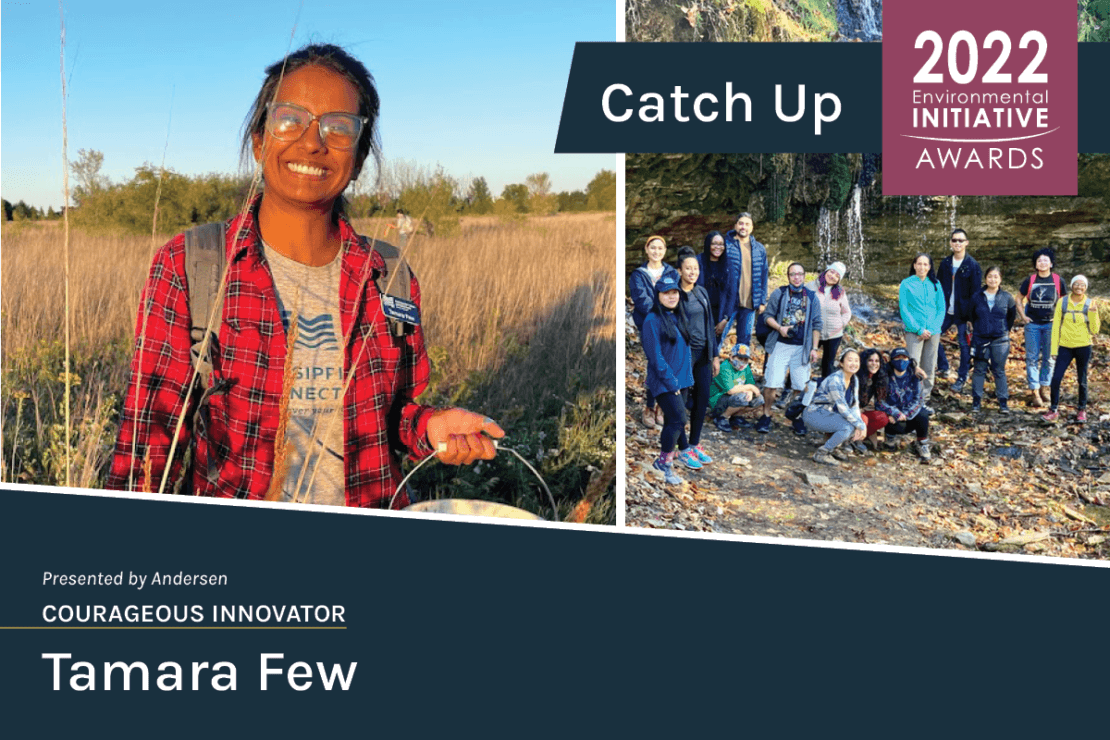Centering BIPOC experiences and our connection to nature

Being in nature surrounded by trees and wildlife friends is a place of peace, belonging, and love for me, and is what ultimately energizes me. But green spaces have been intentionally and systematically turned into spaces for white people in this country, which has resulted in spaces that can feel unsafe and not meant for myself and other Black, Indigenous, and people of color (BIPOC). Stepping into these natural spaces feels like an intentional act of bravery.
Whereas finding peace, connection, and joy in these natural spaces feels like love. I want myself and other Black, Indigenous, and people of color to be able to confidently and easily take up space in the outdoors to heal, build connections and relationships, feel love, and find joy.
I have been a program coordinator at Mississippi Park Connection (MPC) for the past two years. In this role, I coordinate two programs: BIPOC in the Outdoors and the Mississippi River Fellowship.
BIPOC in the Outdoors is a Twin Cities movement that centers the experiences of Black, Indigenous, and people of color, and our relationship to nature, land, and each other. I started the program in the fall of 2020 after collaborating on BIPOC events with Asha Shoffner, Saint Paul Parks and Recreation’s environmental and outdoor education coordinator, who started the initiative that summer. Through the program, I coordinate and help lead events ranging from habitat restoration and recreation on and along the Mississippi River, to educational workshops and simply being in community with others while in nature.
I also co-coordinate the Mississippi River Fellowship, a 10-week paid summer fellowship for young adults who identify as BIPOC to explore the different branches of the National Park Service and the environmental field. The fellows work directly with National Park Service rangers, Mississippi Park Connection staff, and park partners to help facilitate educational programs, habitat restoration events, and wildlife monitoring on the Mississippi River.
We need initiatives like the BIPOC in the Outdoors movement in the Twin Cities for so many reasons including:
- Changing the face of the outdoors and seeing that change represented in environmental/outdoor recreation fields and the outdoors.
- Increasing diverse perspectives, narratives, worldviews and cultural history, land stewardship, and outdoor education.
- Creating a wide-reaching network of people and job opportunities in the environmental/outdoor recreation field.
- Creating safe spaces for BIPOC to be in community with the outdoors, learning from each other and from the land.
There are numerous ways to support BIPOC engagement with the outdoors, such as hiring BIPOC in the environmental/outdoor recreation fields. Representation is important. Also, remain open and honest about the situation at hand, ask what support is genuinely needed, and then provide that support.
Lastly, anyone may support and invest in BIPOC-lead organizations and initiatives by donating to Mississippi Park Connection and other organizations. To support Mississippi Park Connection’s BIPOC in the Outdoors program, click the “Designate my gift” dropdown box and select “BIPOC in the Outdoors.”
Tamara Few is the recipient of the 2022 Courageous Innovator award for her work creating programs and events that provide intentional spaces for BIPOC community members to engage with parks in ways that are empowering, restorative, and joyous.
Nominations for the 2023 Environmental Initiative Awards will open on Monday, Jan. 9, 2023. The Environmental Initiative Awards recognizes those working in partnership at the nexus of a healthy environment, a prosperous economy, and an equitable society.